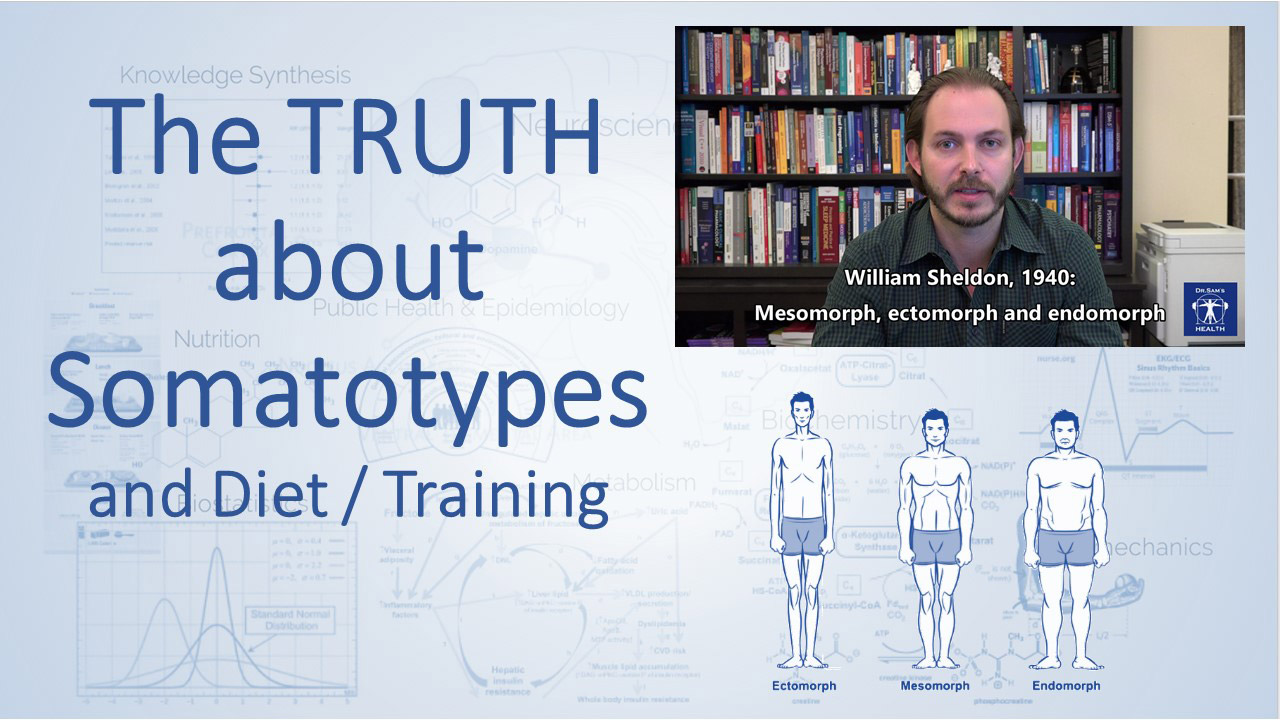
Several days ago, I came across a very funny video by Alan Robertson from Every Damn Day Fitness where he roasts couple of youtubers as they claim that you need to know your somatotype to lose weight and to train properly. The roast was hilarious and I had a nice discussion with Alan's followers. Also, the claims sounded ridiculous and as a scientist I feel compelled to talk about somatotypes in my blog.
What is somatotype?
Let me start with describing the somatotypes in general. The term was introduced by American psychologist William Sheldon in 1940. He tried to describe different types of body constitution to temperament and personality traits. Please note that Watson and Creek came up with the DNA structure in 1952, so you can see what era of science Dr.Sheldon was operating in. I would like to say from the very beginning that there is nothing wrong scientifically with the idea of describing human body and to trying to come up with a classification of the body types. Scientists were doing it for ages and a good portion of anthropology is descriptive. Moreover, even in 1940 the idea of connecting certain body types with personality or predisposition to certain mental illnesses was not particularly new – I am pretty sure that Dr.Sheldon was familiar with the works of Dr.Ernst Kretschmer, who also described 3 body types – athletic, asthenic and pyknic – and correlated them with some mental illnesses.
What did Dr.Sheldon come up with?
Interestingly enough, Dr.Sheldon also came up with 3 body types, which he called somatotypes. He named then ectomorph, endomorph and mesomorph using the embryonic germ layers to coin the terms, somewhat questionable idea to being with, but it's his right and it's reflective of the era in general. He described some personality traits commonly seen in ecto- meso- and endomorphs and, again there is nothing really wrong with that. We can scrutinize this approach and criticize it, but essentially there is nothing really wrong with it, it's just a hypothesis and I would like to give him credit for trying to test it. There were a number of criticisms of his methods and findings, his approach was modified by his collaborators later on and there were quite a few studies finding some weak associations between specific somatotypes, personality traits and athletic performance. Some of these studies were done recently, so we can't really completely discard the idea, moreover, I think we shouldn't as it has some merit, but I don't think that the claim that we should tailor our diet or workout plans to somatotypes has much science to back it up.
The limitations of somatotyping
There are a couple of things we should mention. First of all, the concept itself was developed a long time ago and there were quite a few developments in science since then – in genetics, nutrition, physiology and biochemistry – so it the concept itself is too simplistic to be used as a guidance. In fact, most of the people would not fall into a specific somatotype as there is a spectrum of features and only few people would be pure, say, ectomorphs or mesomorphs. Dr.Sheldon himself used a scale for each body type element. For example, one can be somewhere between 1 and 7 on the scale of mesomorphy. The methodological flaws of the original study can be discussed at length, but, I think, it would be sufficient to say that virtually no one has one specific body type. Another important aspect is that the body type can change – if you build some muscle you will rate higher on mesomorphy scale or if you lose some body fat you will score lower on endomorphy scale.
Somatotypes and diet / training.
The truth is that wherever a person is on somatotype classification, it all boils down to simple description of their body composition and genetics. Someone who is tall and has long limbs (ectomorph) will have more difficulties with lifting heavy weights and building muscle than a typical mesomorph, but they will still be able to build muscle. Someone who is an endomorph would be more likely to have a stocky, overweight appearance and will likely need to lose weight, but that applies to all somatotypes. If you have a high body fat percentage – you need to lose weight whether you are an endomorph or mesomorph or ectomorph. The basic principles remain the same – you need to train in order to develop your muscles and you need to create a caloric deficit if you want to lose fat. Somatotypes can be used to describe your body structure and composition, but your somatotype has little to do with your transformation plan, which is based on your goals.
Summary
There is nothing wrong with somatotypes, it's just a way to describe your body constitution, but the truth is that you have to design your training program and diet based on the goals you want to achieve. If you can't lose weight, it's not because you're endomorph, it's because you failed to create caloric deficit. I hope that now we have clarified this and you can save some time and effort by not falling into a trap of misinformation and by using valid scientific constructs to guide your training and weight loss.
I will continue presenting them in my blogs, so stay tuned and if you have any further questions, by all means, please ask them, leave comments and check out my YouTube channel for more information.
Sincerely Yours,
Dr.Sam
